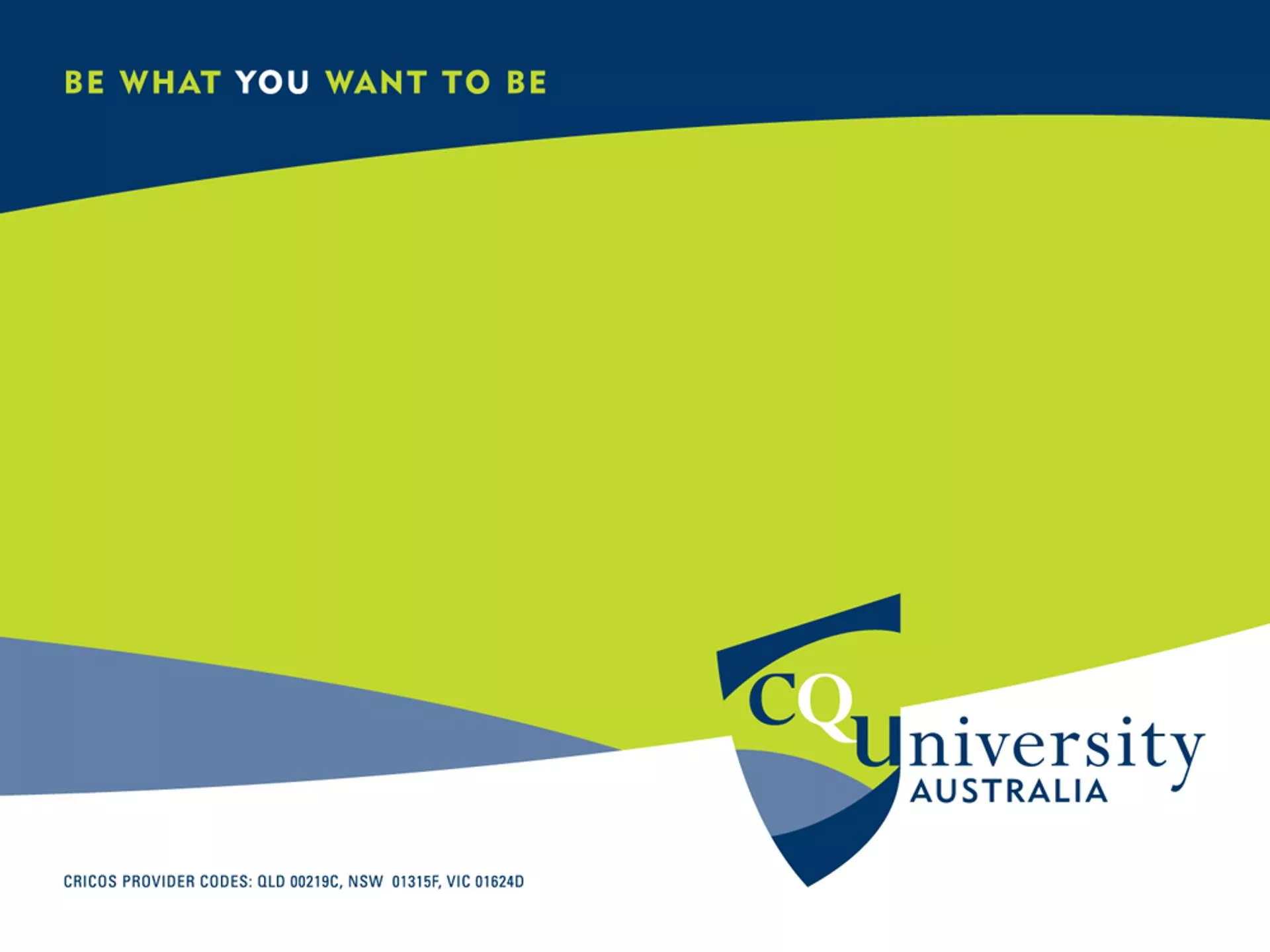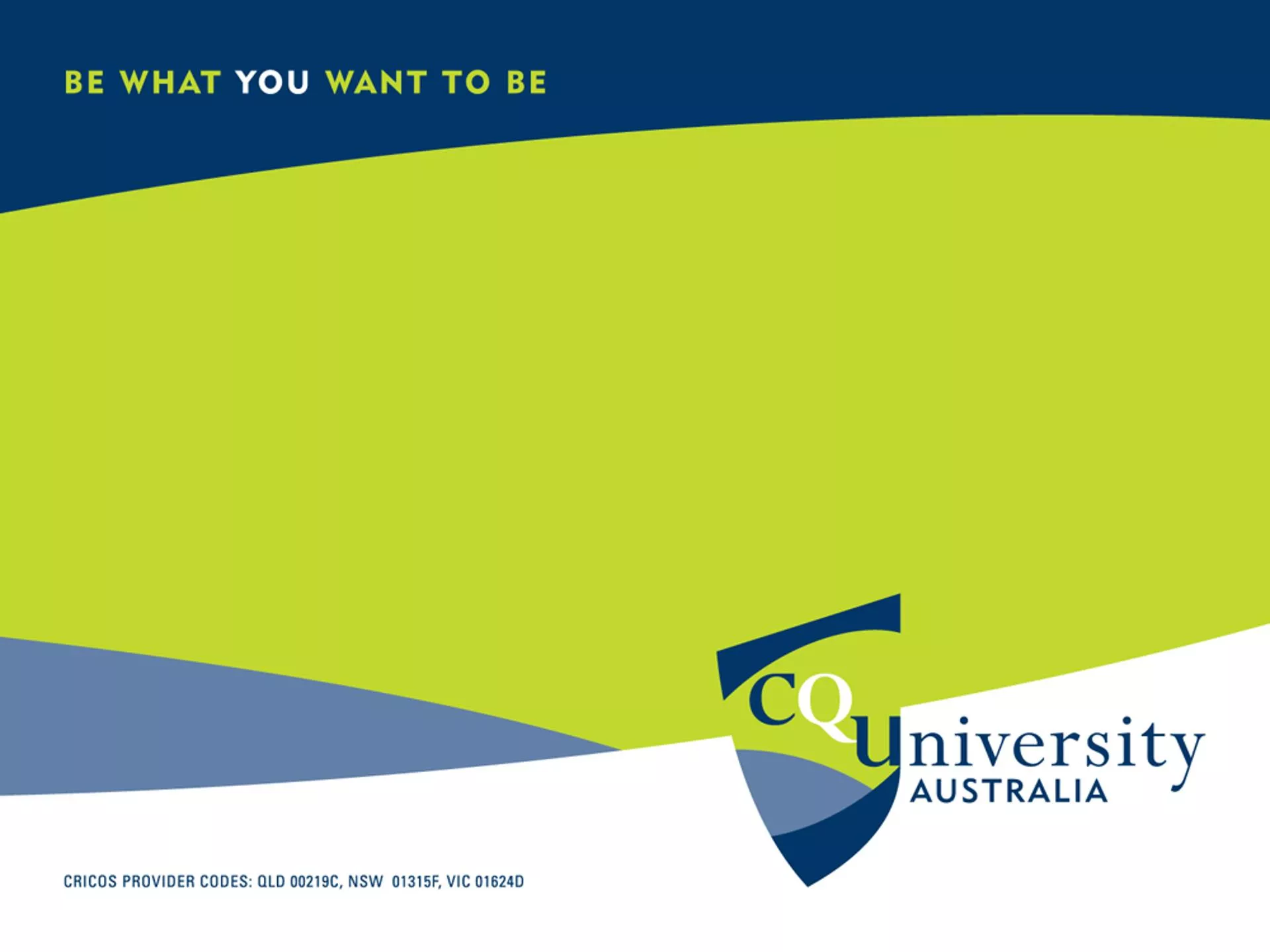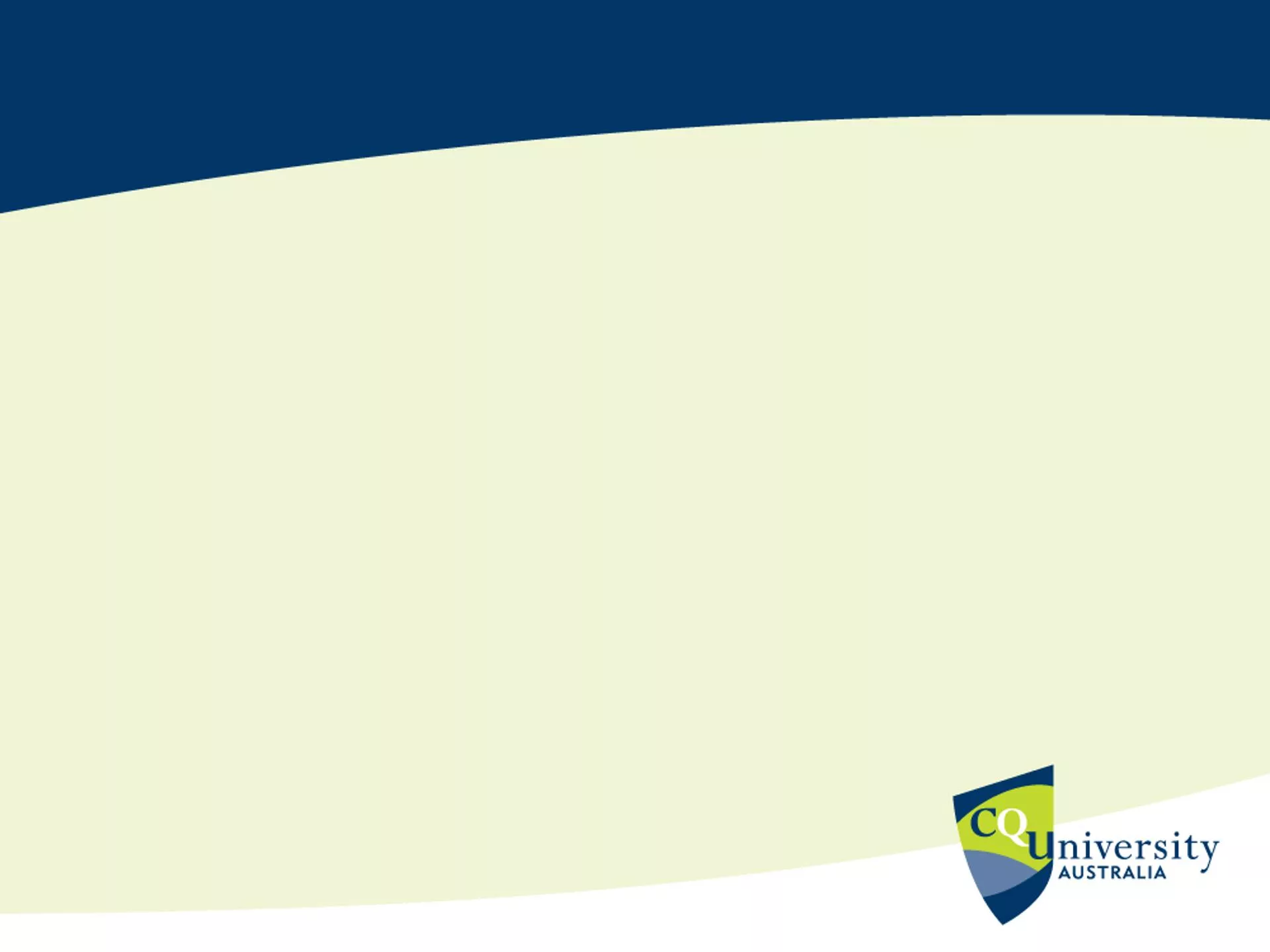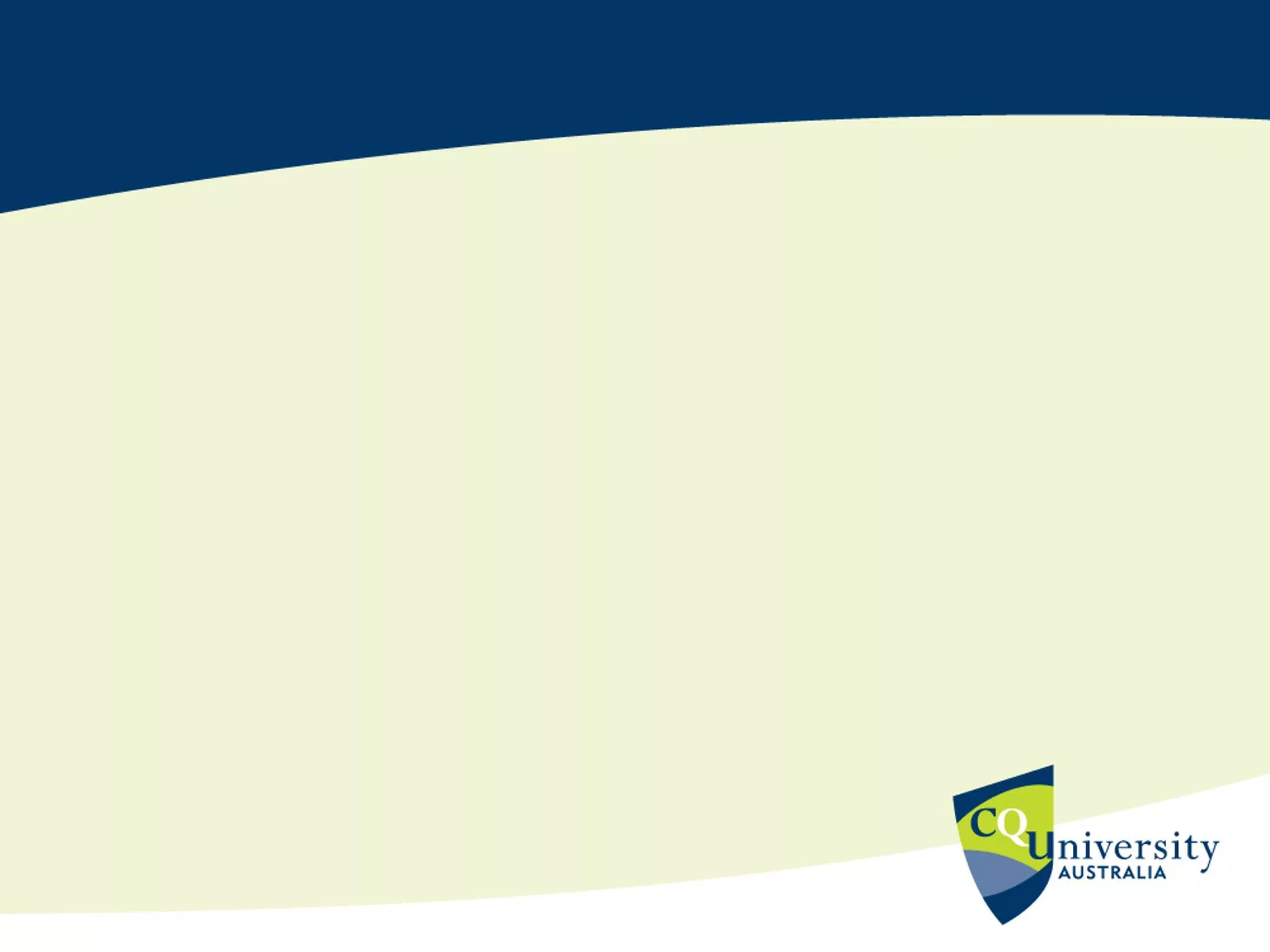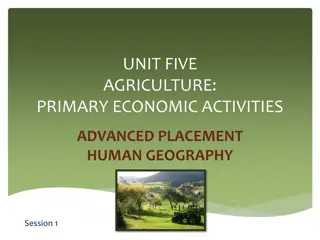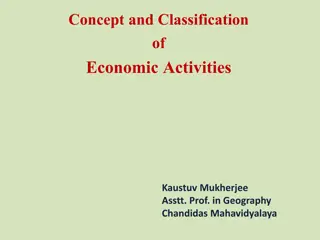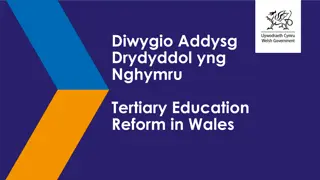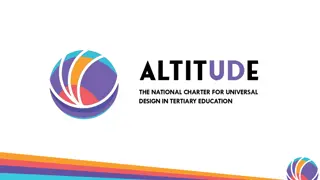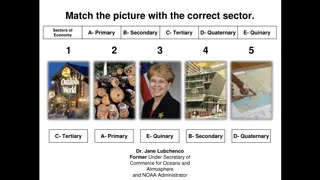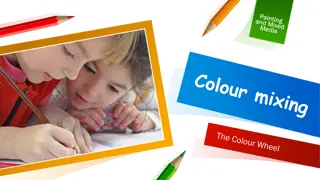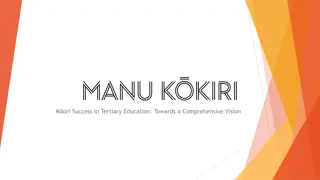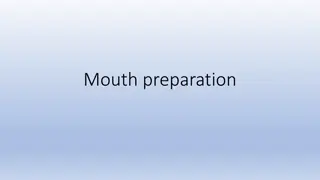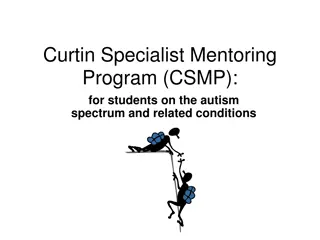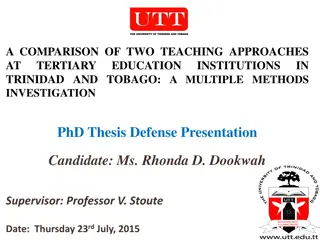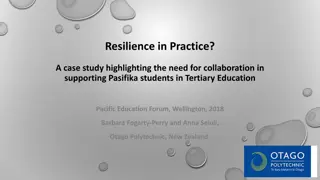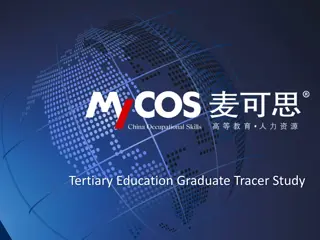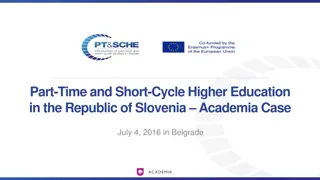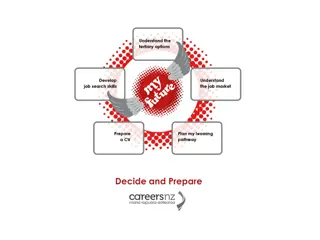CQUniversity's STEPS Program: Empowering Tertiary Education Preparation
Providing a pathway to tertiary education, CQUniversity's Skills for Tertiary Education Preparatory Studies (STEPS) program offers flexible study options, eligibility for various individuals, and a straightforward application process. With a history spanning 27 years, the program aims to enhance retention rates, course offerings, and overall student experience. Through a combination of internal and distance learning modes, applicants can develop essential skills and knowledge for successful undergraduate studies. Entry requirements include skills assessments, interviews, and a commitment to the program's objectives.
Download Presentation

Please find below an Image/Link to download the presentation.
The content on the website is provided AS IS for your information and personal use only. It may not be sold, licensed, or shared on other websites without obtaining consent from the author. Download presentation by click this link. If you encounter any issues during the download, it is possible that the publisher has removed the file from their server.
E N D
Presentation Transcript
Enabling Education at CQUniversity STEPS Skills for Tertiary Education Preparatory Program
Location Brisbane Bundaberg Emerald Distance Geraldton Gladstone Mackay Noosa Rockhampton Sydney
2011 Restructure Objectives for 2012 Provide more flexibility Improve retention and articulation Strengthen the course offerings Handle enrolment more responsibly to ensure assumed knowledge acquisition for undergraduate programs
Skills for Tertiary Education Preparatory Studies 2012
Eligibility Australian and New Zealand citizens Permanent residents Holders of humanitarian visas 18 years and over in the year of initial enrolment
Duration Minimum of 1 term (12 weeks) Maximum of 6 terms (2 years)
Modes of Study Full time 3-4 courses/term Part time 1-2 courses/term Centrelink approved
Study options Option 1: Internal (Term 1 and 2) Option 2: Distance (Terms 1, 2, 3) Option 3: Combination Internal/Distance (Terms 1 and 2) * Distance only in Term 3
Application for entry Applicants apply directly to CQUniversity Complete a testing and interview process
Entry Requirements Entrance skills assessment Literacy and numeracy Computing readiness inventory Individual interview Informed by Personal Writing piece submitted prior to interview Establishment of Study Plan Commitment to the program
Costs No tuition fees Textbooks and resources Available via Moodle Optional purchase of hard copy texts/study guides at a minimal cost Students need to purchase Stella Cottrell s text The Study Skills Handbook, 4th edn - $34 available CQUni Bookshop Stationery, photocopying and printing Calculator - scientific Computer costs Fuel Day-care Reduced work
Delivery platforms Face-to-face, on campus Moodle STEPS Program, Courses Computer Lab sessions ISL Blackboard Collaborate
Resources Course Profile (online) Study Guide Text book Online resources (Moodle) STEPS Guide for Students and Getting Started with CQUni Systems Guide close
Program structure 1 core course Preparation Skills for University 11 elective courses Students are eligible to complete as many elective courses as are required for their individual study plan, based on the applicability of the course content to the student s undergraduate program of choice.
1 core course SKIL40025 Preparation Skills for University Aims to: help students become self-directed, active and confident learners encourage students to adopt a critically reflective approach to their studies i.e. time management and goal setting; individual learning preferences and study habits; management of their study and career paths have students become familiar with the procedures and systems at CQUniversity
11 electives 1. LNGE40049 Essay Writing for University 2. LNGE40064 Technical Writing for University 3. MATH40237 Fundamental Mathematics for University 4. MATH40228 Intermediate Mathematics for University 5. MATH40252 Technical Mathematics for University 6. COIT40206 Computing Skills for University 7. SKIL40016 Positive Learning for University 8. PHYS40110 Introductory Physics 9. BIOL40108 Introductory Biology 10. CHEM40079 Introductory Chemistry 11. SCIE40018 Foundation Science
SKIL40025 Preparation Skills for University This course is designed to help students become self- directed, active and confident learners. It introduces them to a range of theories and concepts to facilitate the development of practical skills and personal attitudes necessary for success in tertiary study. Students are encouraged to adopt a critically reflective approach to all aspects of their studies, including individual learning preferences and study habits; time management and goal-setting; management of their study and career paths; and research. They will become familiar with the procedures and systems that characterise tertiary study, with a particular focus on studying at CQUniversity.
SKIL40016 Positive Learning for University Through a positive psychology framework, Preparation for Positive Learning introduces students to a variety of concepts and techniques to enhance clarity, optimism, gratitude, strengths, positive relationships, communication skills and healthy living. A mixture of theory, practical activities and reflection demonstrate how personal attitudes and beliefs affect learning and study. Students therefore learn how to think more realistically and flexibly about the challenges they may encounter in higher education. In addition to the content, all course materials are presented online and students are exposed to a number of eLearning (online) tools to actively engage and support their learning.
COIT40206 Computing Skills for University On completion of this course, students should be able to use a word processor to format the layout of an academic essay and a report. The students should be able to use a spreadsheet to complete a workbook, create simple formula, apply simple functions as well as create and format charts. The students should be able to use the Internet, negotiate a Learning Management System and communicate using email at an academic level. Students should also be able to create a basic Power Point presentation appropriate for university courses.
LNGE40049 Essay Writing for University On completion of this course students should be able to apply the reading, thinking and writing skills necessary for academic purposes utilising appropriate grammar and writing patterns. Students are familiarised with the stages of the writing process and assisted to apply a range of associated learning strategies. In addition, students develop strategies to plan and write paragraphs, using academic language and conventions. They are introduced to research, note- taking and referencing skills for this purpose. They are also encouraged to examine their own worldviews, and those of others, and to develop critical thinking skills. Students have the opportunity to participate in online discussion forums to support their learning. The course culminates with students planning and writing an academic essay, using independent research skills acquired throughout the course. Reflective practice is integral to the course and this enables students to consider the connection between their personal learning journal and the course outcomes.
LNGE40064 Technical Writing for University This course introduces students to the writing skills they will need to succeed in university science and technology courses. Students will develop skills in writing clearly and concisely, organising and presenting information in a logical way, and applying relevant conventions of style and grammar. Through intensive reading and writing, they will learn to critically analyse, paraphrase and summarise a range of scientific and technical texts. Students will consolidate their learning by researching and writing a report.
Mathematics suite MATH40228 Intermediate Mathematics for University Intermediate Mathematics for University is designed to follow on from a study of introductory mathematical concepts, such as Fundamental Mathematics for University. Students complete core and optional modules, which are chosen according to their future study plans. The course has been developed to provide knowledge of various mathematical topics including statistics, standard deviation, probability, absolute value, inequalities, simultaneous equations, quadratic equations, functions, logarithms, trigonometry, geometry, variation, ratio, proportion, financial mathematics, annuities, series and sequences. MATH40237 Fundamental Mathematics for University Fundamental Mathematics for University is designed to provide students with foundation concepts, rules and methods of elementary mathematics. The main aim of this course is to provide the fundamentals of mathematics, which are necessary to develop a unified body of knowledge. Topics covered in the course include operations, percentages, introductory algebra, simple equation solving, exponents, linear equations, introductory statistics and units and conversions. MATH40252 Technical Mathematics for University Technical Mathematics for University is designed to follow on from Intermediate Mathematics for University. The completion of both Intermediate Mathematics for University and Technical Mathematics for University prepares students for first year tertiary mathematics in applied science and engineering. The course has been developed to provide knowledge of various mathematical topics including algebra techniques; trigonometric functions, ratios, and graphs; plane and analytical geometry; introductory vectors and introductory calculus.
CHEM40070 Introductory Chemistry The aim of Introductory Chemistry is to provide you with a foundation in Chemistry for your tertiary study. Chemistry is a language with structure and rules to follow just like the English language. Introductory Chemistry introduces the terms, concepts and rules in chemistry. These concepts have been related to everyday materials and events to place chemistry within the context of your own experiences. This course covers a range of chemical topics, such as matter, molecules, chemical reactions, acids and bases and organic chemistry, as well as introducing the mathematics used in science.
BIOL40103 Introductory Biology Introductory Biology is the study of living things. It encompasses the cellular basis of living things, the energy metabolism that underlies the activities of life, and the genetic bases for inheritance in organisms. Course also includes the study of evolutionary relationships among organisms and the diversity of life on earth. It considers the biology of micro-organisms, plants, and animals, and it brings together the structural and functional relationships that underlie their day-to-day activities. Introductory Biology draws on the sciences of chemistry and physics for its foundations and applies the laws of these disciplines to living things
PHYS40110 Introductory Physics This course will prepare student for university study in engineering or the physical sciences. Students will gain an understanding of the basic concepts in physics and learn to apply the principles of physics to solve problems of a physical nature in everyday life. Topics covered in this course include mechanics, electricity, electromagnetism, waves, optics, and atomic physics
SCIE40020 Foundation Science This course will enable students with no recent formal education in science to gain the necessary understanding of the basic principles of the major branches of science that will serve as a foundation for entry into relevant programs, such as nursing/health, and related areas. Students will develop study skills in selecting and evaluating scientific information. They will also enhance their knowledge and understanding of the fundamentals of biology, chemistry, physics and related mathematical concepts, and their applications in real- world contexts.
Upgrading academic skills Dual enrolment for current CQUniversity undergraduate students needing to up skill Course load taken into consideration in establishing a study plan Specific up skilling needs determine individual study plan
Transition to Undergraduate study Guaranteed entry to CQUniversity courses dependent on successful completion of courses on the Required Study Plan and the appropriate GPA
Guaranteed entry to Undergraduate study M:\Campuses\AC Forms & Guides\Interview guides\Guaranteed entry - 23 May 2014.pdf M:\Campuses\AC Forms & Guides\Interview guides\Quota-based programs 27 May 2014.pdf
The STEPS Team STEPS
Please contact for any further information Chris Cook Head of Program 07 49707168 c.cook2@cqu.edu.au Bundaberg Karen Seary Associate Dean ALSU 07 41507067 k.seary@cqu.edu.au Bundaberg


